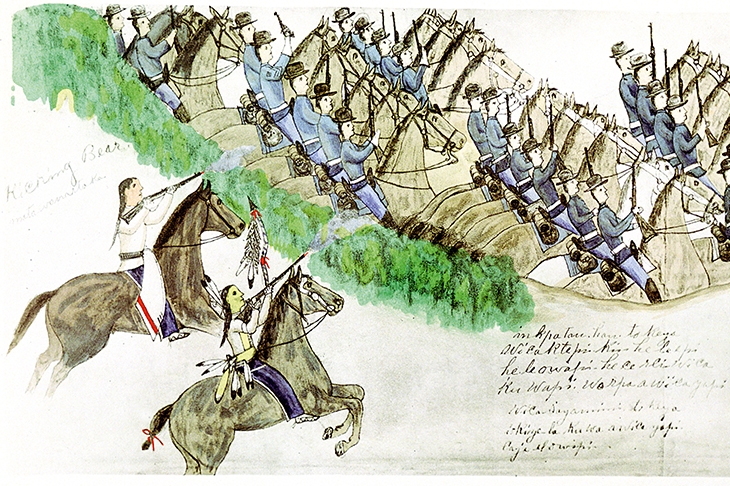‘What makes the Red Man red?’ the Lost Boys asked in Disney’s Peter Pan (1953). According to Sammy Cahn’s lyric, it was embarrassment: ‘The very first Injun prince/ He kissed a maid and start to blush.’
Redness is everywhere in The Earth is Weeping — in the anger of the Indians, harried and starved into fatal resistance; in the shame of the whites, with their fork-tongued treaties and heavy weapons; and in the blood, Indian and white, that flows on almost every page of Peter Cozzens’s sweeping, expert and appalling account of the murder of America’s Indians.
Every nation has its founding sin. America, the land of plenty, has two. Cozzens’s story begins in the 1860s, with the expiation of slavery and the refounding of the United States, but the commission of murder was already well advanced. In the early decades of European settlement, disease and war had reduced the Indians of the north east. In 1830, Andrew Jackson’s administration passed the Removal Act, pushing the Indians of the old north west and the ‘civilised’ tribes of Alabama and Georgia across the Mississippi and into a swathe of the Great Plains, reserved as Indian territory.
Jackson believed the army explorers who had reported that the Plains were unsuited to white settlement. In the 1840s, American maps showed a permanent Indian frontier, running south from Minnesota to Louisiana. Meanwhile, Cozzens writes, ‘a cataclysmic chain of events’ dissolved the frontier: the rush for land in Oregon and gold in California, and the annexation of Texas, California and the south west. By 1860, there were more whites in California than Indians in the entire west.
There were also more Indians in the Great Plains than ever before. While the whites stripped the land on their way westwards, displaced tribes like the Sioux, Cheyenne and Arapohoe fought for the territory of established Plains tribes like the Pawnee and Crow.









Comments
Join the debate for just £1 a month
Be part of the conversation with other Spectator readers by getting your first three months for £3.
UNLOCK ACCESS Just £1 a monthAlready a subscriber? Log in